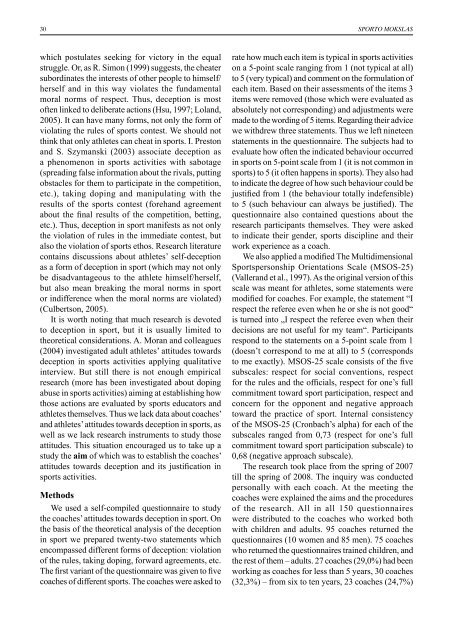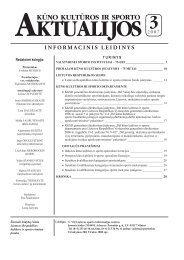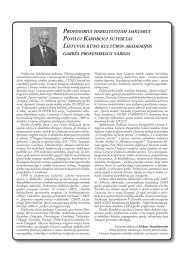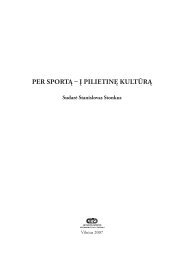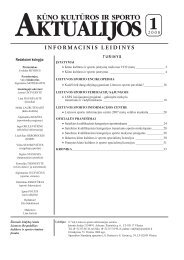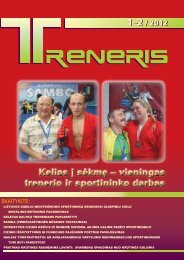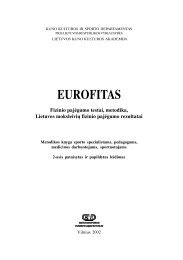Nr. 1 - Lietuvos sporto informacijos centras
Nr. 1 - Lietuvos sporto informacijos centras
Nr. 1 - Lietuvos sporto informacijos centras
You also want an ePaper? Increase the reach of your titles
YUMPU automatically turns print PDFs into web optimized ePapers that Google loves.
30<br />
SPORTO MOKSLAS<br />
which postulates seeking for victory in the equal<br />
struggle. Or, as R. Simon (1999) suggests, the cheater<br />
subordinates the interests of other people to himself/<br />
herself and in this way violates the fundamental<br />
moral norms of respect. Thus, deception is most<br />
often linked to deliberate actions (Hsu, 1997; Loland,<br />
2005). It can have many forms, not only the form of<br />
violating the rules of sports contest. We should not<br />
think that only athletes can cheat in sports. I. Preston<br />
and S. Szymanski (2003) associate deception as<br />
a phenomenon in sports activities with sabotage<br />
(spreading false information about the rivals, putting<br />
obstacles for them to participate in the competition,<br />
etc.), taking doping and manipulating with the<br />
results of the sports contest (forehand agreement<br />
about the final results of the competition, betting,<br />
etc.). Thus, deception in sport manifests as not only<br />
the violation of rules in the immediate contest, but<br />
also the violation of sports ethos. Research literature<br />
contains discussions about athletes’ self-deception<br />
as a form of deception in sport (which may not only<br />
be disadvantageous to the athlete himself/herself,<br />
but also mean breaking the moral norms in sport<br />
or indifference when the moral norms are violated)<br />
(Culbertson, 2005).<br />
It is worth noting that much research is devoted<br />
to deception in sport, but it is usually limited to<br />
theoretical considerations. A. Moran and colleagues<br />
(2004) investigated adult athletes’ attitudes towards<br />
deception in sports activities applying qualitative<br />
interview. But still there is not enough empirical<br />
research (more has been investigated about doping<br />
abuse in sports activities) aiming at establishing how<br />
those actions are evaluated by sports educators and<br />
athletes themselves. Thus we lack data about coaches’<br />
and athletes’ attitudes towards deception in sports, as<br />
well as we lack research instruments to study those<br />
attitudes. This situation encouraged us to take up a<br />
study the aim of which was to establish the coaches’<br />
attitudes towards deception and its justification in<br />
sports activities.<br />
Methods<br />
We used a self-compiled questionnaire to study<br />
the coaches’ attitudes towards deception in sport. On<br />
the basis of the theoretical analysis of the deception<br />
in sport we prepared twenty-two statements which<br />
encompassed different forms of deception: violation<br />
of the rules, taking doping, forward agreements, etc.<br />
The first variant of the questionnaire was given to five<br />
coaches of different sports. The coaches were asked to<br />
rate how much each item is typical in sports activities<br />
on a 5-point scale ranging from 1 (not typical at all)<br />
to 5 (very typical) and comment on the formulation of<br />
each item. Based on their assessments of the items 3<br />
items were removed (those which were evaluated as<br />
absolutely not corresponding) and adjustments were<br />
made to the wording of 5 items. Regarding their advice<br />
we withdrew three statements. Thus we left nineteen<br />
statements in the questionnaire. The subjects had to<br />
evaluate how often the indicated behaviour occurred<br />
in sports on 5-point scale from 1 (it is not common in<br />
sports) to 5 (it often happens in sports). They also had<br />
to indicate the degree of how such behaviour could be<br />
justified from 1 (the behaviour totally indefensible)<br />
to 5 (such behaviour can always be justified). The<br />
questionnaire also contained questions about the<br />
research participants themselves. They were asked<br />
to indicate their gender, sports discipline and their<br />
work experience as a coach.<br />
We also applied a modified The Multidimensional<br />
Sportspersonship Orientations Scale (MSOS-25)<br />
(Vallerand et al., 1997). As the original version of this<br />
scale was meant for athletes, some statements were<br />
modified for coaches. For example, the statement “I<br />
respect the referee even when he or she is not good“<br />
is turned into „I respect the referee even when their<br />
decisions are not useful for my team“. Participants<br />
respond to the statements on a 5‐point scale from 1<br />
(doesn’t correspond to me at all) to 5 (corresponds<br />
to me exactly). MSOS‐25 scale consists of the five<br />
subscales: respect for social conventions, respect<br />
for the rules and the officials, respect for one’s full<br />
commitment toward sport participation, respect and<br />
concern for the opponent and negative approach<br />
toward the practice of sport. Internal consistency<br />
of the MSOS‐25 (Cronbach’s alpha) for each of the<br />
subscales ranged from 0,73 (respect for one’s full<br />
commitment toward sport participation subscale) to<br />
0,68 (negative approach subscale).<br />
The research took place from the spring of 2007<br />
till the spring of 2008. The inquiry was conducted<br />
personally with each coach. At the meeting the<br />
coaches were explained the aims and the procedures<br />
of the research. All in all 150 questionnaires<br />
were distributed to the coaches who worked both<br />
with children and adults. 95 coaches returned the<br />
questionnaires (10 women and 85 men). 75 coaches<br />
who returned the questionnaires trained children, and<br />
the rest of them – adults. 27 coaches (29,0%) had been<br />
working as coaches for less than 5 years, 30 coaches<br />
(32,3%) – from six to ten years, 23 coaches (24,7%)


